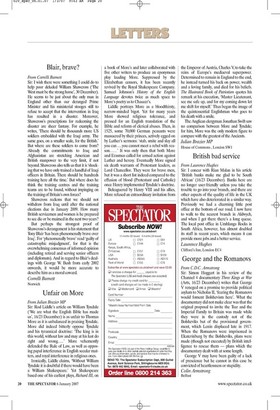Unfair on More
From Julian Brazier MP Sir: Rod Liddle's article on William Tyndale ('We are what the English Bible has made us', 16/23 December) is as unfair to Thomas More as it is unbalanced in praising Tyndale. More did indeed bitterly oppose Tyndale and his tyrannical doctrine: The king is in this world, without law and may at his lust do right and wrong....' More vehemently defended the Rule of Law, as well as opposing papal interference in English secular matters, and royal interference in religious ones.
Ironically, Liddle claims, 'Without William Tyndale it is doubtful if there would have been a William Shakespeare.' Yet Shakespeare based one of his earliest plays, Richard III, on a book of More's and later collaborated with five other writers to produce an eponymous play lauding More. Suppressed by the Elizabethan censors, it has been recently revived by the Royal Shakespeare Company. Samuel Johnson's History of the English Language devotes twice as much space to More's poetry as to Chaucer's.
Liddle portrays More as a bloodthirsty, narrow-minded bigot. Yet for many years More showed religious tolerance, and pressed for an English translation of the Bible and reform of clerical abuses. Then, in 1525, some 70,000 German peasants were massacred by their princes, actively egged on by Luther's sermons: 'stab, smite and slay all you can ... you cannot meet a rebel with reason. . . . ' It was only then that both More and Erasmus called for armed action against Luther and heresy. Eventually More signed six death warrants of Protestant leaders, as Lord Chancellor. They were for brave men, but it was a short list indeed compared to the effusion of blood (Protestant and Catholic) once Henry implemented Tyndale's doctrine.
Beleaguered by Henry VIII and his allies, More refused an extraordinary invitation from the Emperor of Austria, Charles V, to take the reins of Europe's mediaeval superpower. Determined to remain in England to the end, he instead turned his back on power, wealth and a loving family, and died for his beliefs. The Illustrated Book of Patriotism quotes his remark at his execution, 'Master Lieutenant, see me safe up, and for my coming down let me shift for myself.' Thus began the image of the quintessential Englishman who goes to his death with a smile.
The Anglican clergyman Jonathan Swift saw no comparison between More and Tyndale; for him, More was the only modern figure to compare with the greatest of the Ancients.
Julian Brazier MP House of Commons , London SW1




































 Previous page
Previous page